Unit 1 What's the matter Section A 课件+音频(共3课时,共48张PPT)人教版八年级下册
文档属性
| 名称 | Unit 1 What's the matter Section A 课件+音频(共3课时,共48张PPT)人教版八年级下册 |
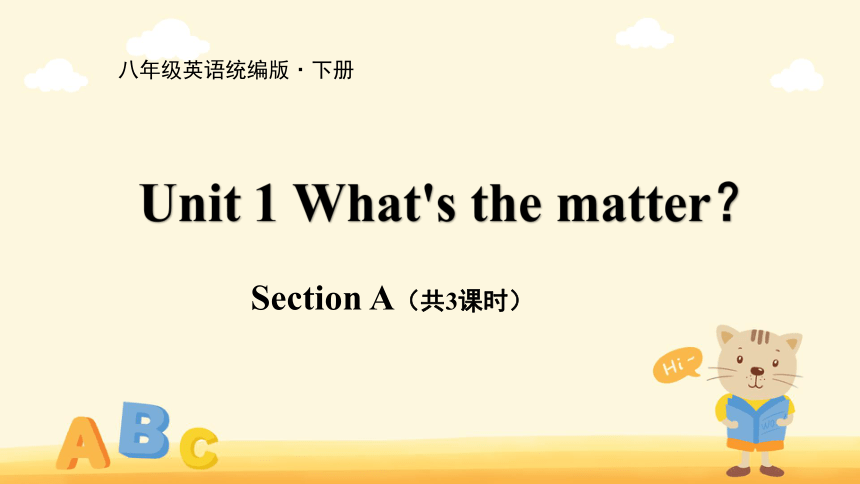
|
|
| 格式 | pptx | ||
| 文件大小 | 17.4MB | ||
| 资源类型 | 教案 | ||
| 版本资源 | 人教新目标(Go for it)版 | ||
| 科目 | 英语 | ||
| 更新时间 | 2024-03-02 21:25:29 | ||
图片预览

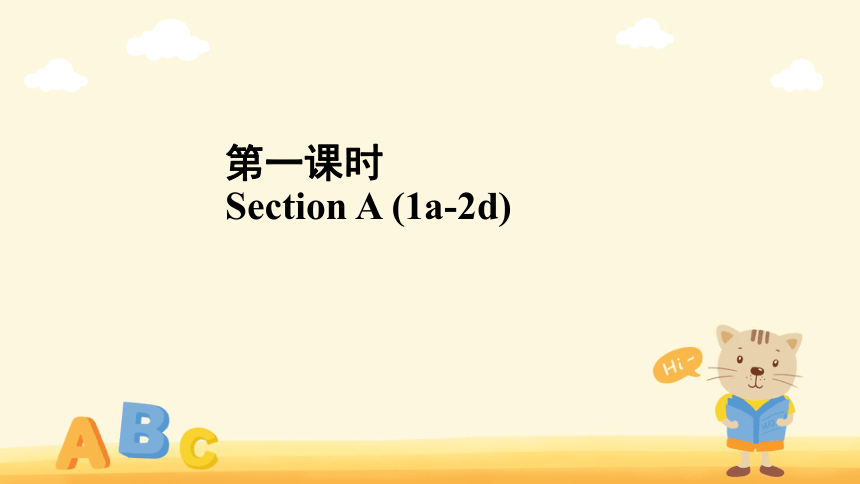
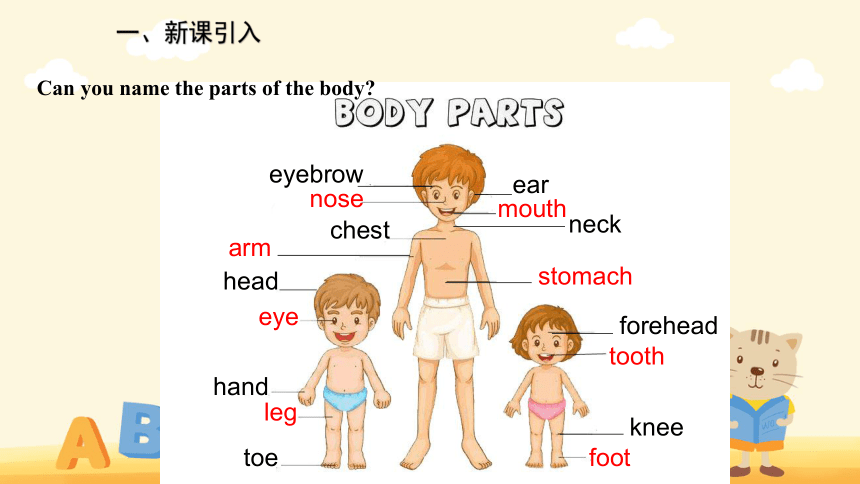
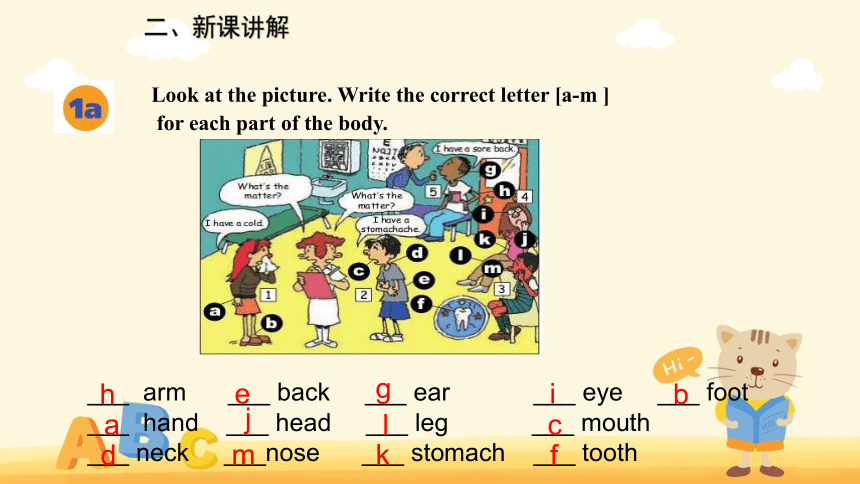
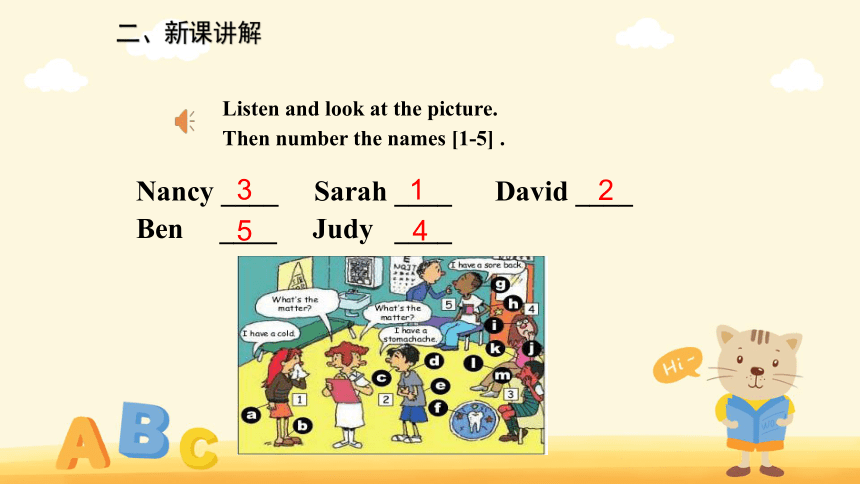
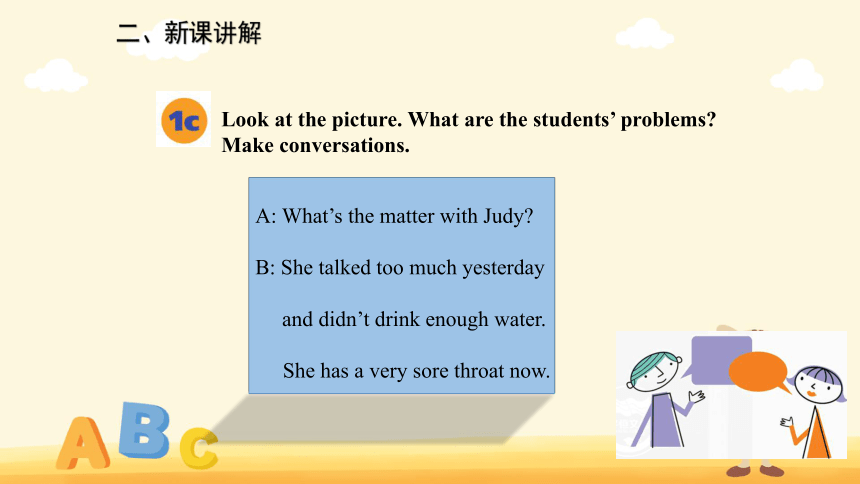
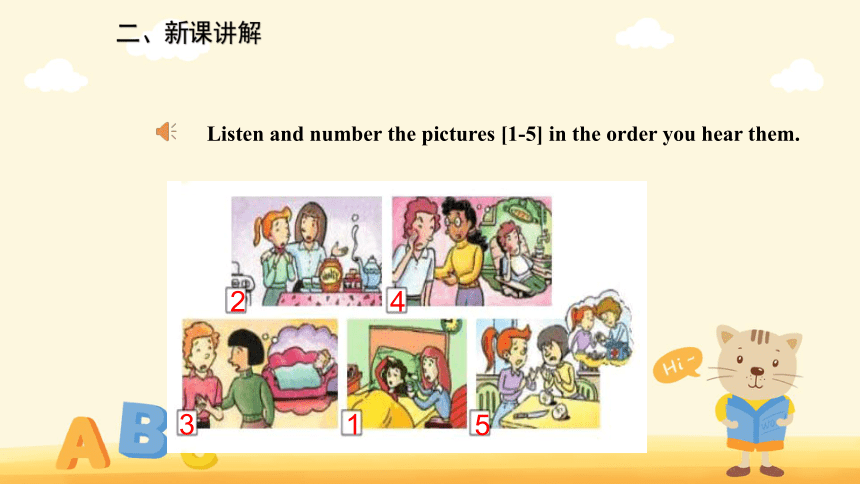
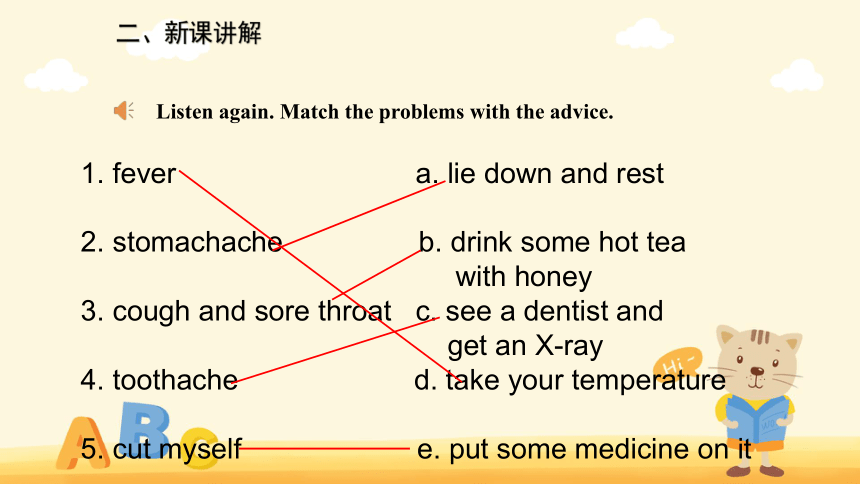
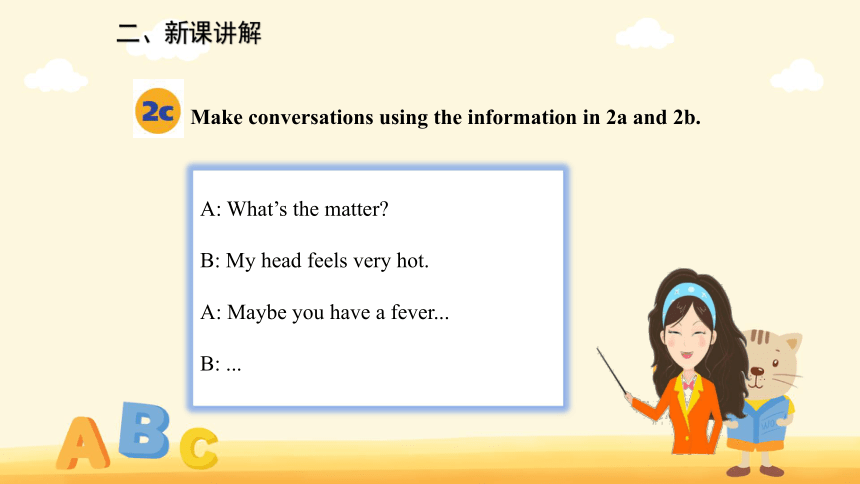
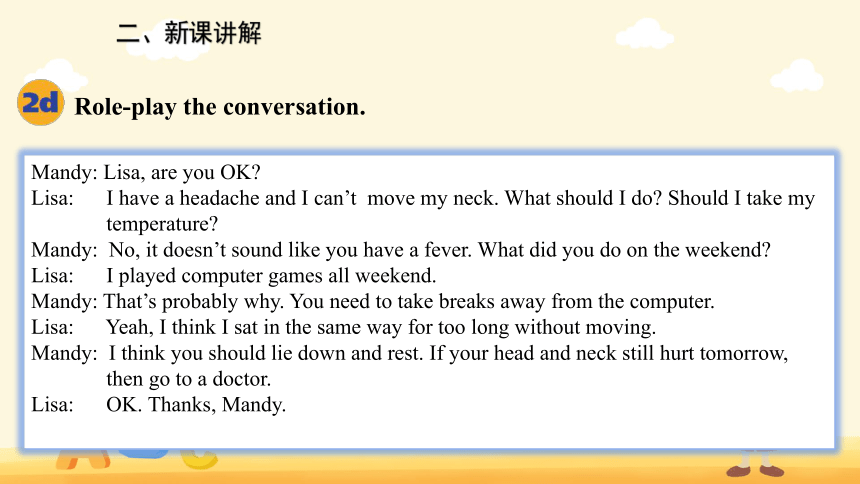
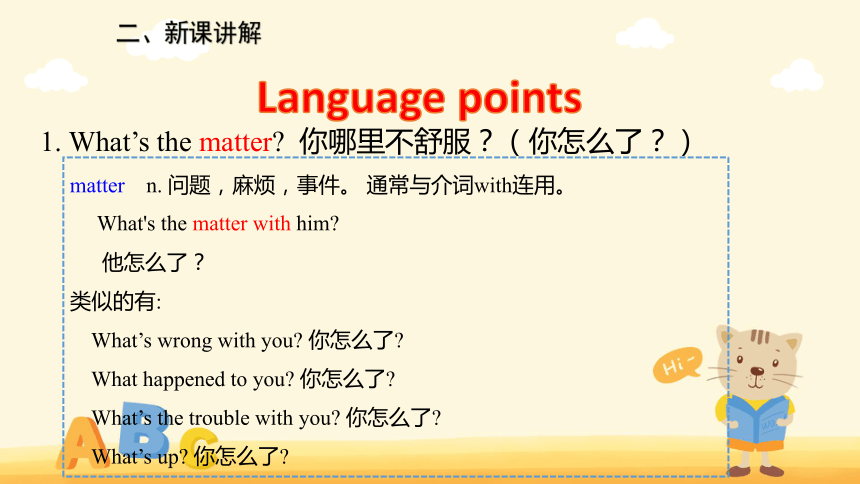
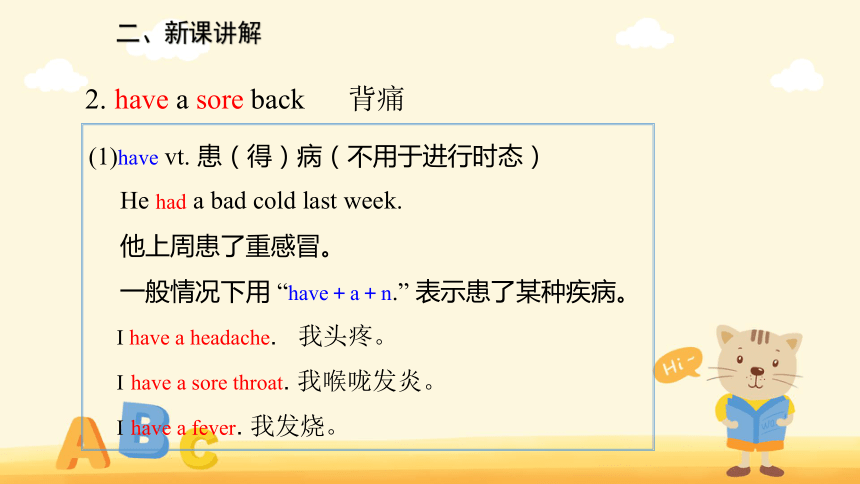
文档简介
(共48张PPT)
Unit 1 What's the matter?
八年级英语统编版·下册
Section A(共3课时)
第一课时
Section A (1a-2d)
一、新课引入
Can you name the parts of the body
eyebrow
nose
ear
mouth
neck
chest
arm
head
eye
hand
leg
toe
stomach
forehead
tooth
knee
foot
二、新课讲解
Look at the picture. Write the correct letter [a-m ]
for each part of the body.
___ arm ___ back ___ ear ___ eye ___ foot
___ hand ___ head ___ leg ___ mouth
___ neck ___nose ___ stomach ___ tooth
h
e
g
i
b
a
j
l
c
d
m
k
f
二、新课讲解
Listen and look at the picture.
Then number the names [1-5] .
Nancy ____ Sarah ____ David ____
Ben ____ Judy ____
3
1
2
5
4
A: What’s the matter with Judy
B: She talked too much yesterday
and didn’t drink enough water.
She has a very sore throat now.
Look at the picture. What are the students’ problems
Make conversations.
二、新课讲解
Listen and number the pictures [1-5] in the order you hear them.
二、新课讲解
4
1
2
3
5
二、新课讲解
Listen again. Match the problems with the advice.
1. fever a. lie down and rest
2. stomachache b. drink some hot tea
with honey
3. cough and sore throat c. see a dentist and
get an X-ray
4. toothache d. take your temperature
5. cut myself e. put some medicine on it
A: What’s the matter
B: My head feels very hot.
A: Maybe you have a fever...
B: ...
二、新课讲解
Make conversations using the information in 2a and 2b.
Mandy: Lisa, are you OK
Lisa: I have a headache and I can’t move my neck. What should I do Should I take my
temperature
Mandy: No, it doesn’t sound like you have a fever. What did you do on the weekend
Lisa: I played computer games all weekend.
Mandy: That’s probably why. You need to take breaks away from the computer.
Lisa: Yeah, I think I sat in the same way for too long without moving.
Mandy: I think you should lie down and rest. If your head and neck still hurt tomorrow,
then go to a doctor.
Lisa: OK. Thanks, Mandy.
二、新课讲解
Role-play the conversation.
1. What’s the matter 你哪里不舒服?(你怎么了?)
Language points
matter n. 问题,麻烦,事件。 通常与介词with连用。
What's the matter with him
他怎么了?
类似的有:
What’s wrong with you 你怎么了
What happened to you 你怎么了
What’s the trouble with you 你怎么了
What’s up 你怎么了
二、新课讲解
2. have a sore back 背痛
(1)have vt. 患(得)病(不用于进行时态)
He had a bad cold last week.
他上周患了重感冒。
一般情况下用 “have+a+n.” 表示患了某种疾病。
I have a headache. 我头疼。
I have a sore throat. 我喉咙发炎。
I have a fever. 我发烧。
二、新课讲解
(2) sore 和 ache
a. sore“痛,疼”,通常指因发炎引起的肌肉疼,在表示身体的某部位疼痛时,常置于部位名词前。
b. ache常指持续性的疼痛,它常与身体部位的名词构成复合词,如:
headache 头痛 backache 背疼
二、新课讲解
3. I have a cold. 我感冒了。
cold 在这里是名词,意为“感冒”。
患感冒:have a cold, catch (a) cold, get a cold.
cold还可用作形容词, 意为“冷的, 寒冷的”。
It’s so cold today that I have a cold.
今天太冷了, 我都感冒了。
※第一个cold是形容词,第二个cold是名词。
二、新课讲解
三、归纳小结
关心他人健康:
What’s the matter (with sb)
What’s wrong (with sb)
患者:
I have a headache.
He has a toothache.
建议:
You/We/He/She/They should do…
You/We/He/She/They’d better do…
四、强化训练
一、 单项选择
1. — __________________
— I have a sore back.
A. What’s the matter
B. What’s wrong with you
C. Do you have a sore back
D. Either A or B.
2. — What’s the matter ____ you, Lucy
— Nothing much.
A. on B with C. to D. of
二、根据首字母和句意完成单词
1. What’s the m_____ with you
2. We hear with our e____ and see with our e_____.
3. He usually goes to school on f_______.
4. I have a t________, so I want to see a dentist.
5. She talked too much yesterday and didn’t drink enough water. She has a very s_____ throat now.
四、强化训练
yes
oot
oothache
atter
ars
ore
五、布置作业
1. Make up a conversation between a doctor and a patient.
2. Recite the conversation in 2d.
第二课时
Section A (3a-4C)
一、新课引入
What’s the matter with the man
He has a toothache. He can’t eat anything.
一、新课引入
1. What happened to the man lying by the road
He may have a terrible health problem.
2. What was the person next to him doing
She was shouting for help.
3. Who do you think was going to save the man
I think the bus driver would save him.
二、新课讲解
Read the passage and answer the following questions.
1. Do you think it comes from a newspaper or a book
Newspaper.
2. How do you know
It is reporting something that happened very recently (i.e.
yesterday), and the whole story is very short.
3a
二、新课讲解
Read the passage again and check(√) the things that happened in the story.
3b
1 ____ Wang Ping was the driver of bus No. 26 at 9:00 a.m. yesterday.
2 ____ Bus No. 26 hit an old man on Zhonghua Road.
3 ____ The old man had a heart problem and needed to go to the hospital right
away.
4 ____ The passengers on the bus did not want to go to the hospital, so only Wang
Ping went with the woman and old man.
5 ____ Some passengers helped to get the old man onto the bus.
6 ____ The old man got to the hospital in time.
√
√
√
√
Discuss the questions with a partner.
1. Why was Wang Ping surprised that the passengers agreed to go
to the hospital with him
2. Did the passengers think Wang Ping did the right thing How do
you know
3. Do you agree that people often do not help others because they
do not want to get into trouble Why or why not
3c
二、新课讲解
二、新课讲解
Fill in the blanks and practice the conversations.
4a
1. A: I hurt ______ when I played basketball yesterday. What _______ I do
B: You ______ see a doctor and get an X-ray.
2. A: _______ the matter
B: My sister and I ______ sore throats.
_______ we go to school
A: No, you _________.
3. A: _____ Mike _____ a fever
B: No, he ________. He _____ a stomachache.
A: He _______ drink some hot tea.
myself
should
should
What’s
have
Should
shouldn’t
Does
have
doesn’t
has
should
二、新课讲解
4b
Circle the best advice for these health problems. Then add your own advice.
1. Jenny cut herself. She should (get an X-ray / put some medicine on the cut).
My advice: _______________________.
Put a bandage on it
2. Kate has a toothache. She should (see a dentist /get some sleep).
My advice: ________________________.
3. Mary and Sue have colds. They shouldn’t (sleep/ exercise).
My advice: ______________________.
She shouldn’t eat cold food
Drink more water
4. Bob has a sore back. He should (lie down and rest /take his temperature).
My advice: ______________.
Get an X-ray
One student mimes a problem. The other students in your group guess the problem and give advice.
二、新课讲解
4c
Name Problem Advice
Liu Peng fall down go home and rest
A: What’s the matter Did you
hurt yourself playing soccer
B: No, I didn’t.
C: Did you fall down
B: Yes, I did.
D: You should go home and get
some rest.
Language points
二、新课讲解
... when the driver saw an old man lying on the side of the road.
...... 这时司机看到一位老人正躺在路边。
see sb. doing sth. 看见某人正在做某事
e.g.当我走过窗边,看见他正在画画。
When I pass the window I see him drawing a picture.
see sb. do sth. 看见某人做过某事
e.g. 我经常看见他画画。
I often see him draw a picture.
2. The bus driver, 24-year-old Wang Ping, stopped the bus without thinking twice.
3. He only thought about saving a life...
Language points
“without thinking”、“about saving a life” 的共同点:
介词 + 名词
宾格代词
doing
用括号内单词正确的形式填空。
1) I am fine. What about ____ (she)
2) Thanks for ______ (tell) me the story
3) It is a sunny day. How about _____ (go) fishing
二、新课讲解
her
telling
going
4. But to his surprise, they all agreed to go with him.
Language points
to one’s surprise 使......惊讶的是,出乎......意料
e.g. To their surprise, all the students passed the exam.
出乎他们的意料,所有学生通过了考试。
To everyone’s surprise, the plan succeeded.
出乎所有人的意料,计划成功了。
二、新课讲解
5. ... because they don’t want any trouble, ...
Language points
trouble意为“困难;麻烦”时,是不可数名词。
e.g. I’m sorry to give you so much trouble.
be in trouble意为“有困难;陷入困境”。
e.g. He always asks me for help when he is in trouble.当他陷入困境时他总是向我寻求帮助。
(2) get sb. into trouble 意为“使某人陷入困境”。
e.g. If you come, you may get me into trouble. 如果你来,你有可能使我陷入困境。
(3) 主语 + have / has trouble (in) doing sth. 意为“某人在做某事方面有困难”。
e.g. I have some trouble (in) reading the letter. 我在读信方面有困难。
trouble意为“麻烦事;烦心事”时,是可数名词。
e.g. She was on the phone for an hour telling me her troubles. 她给我打了一个小时电话来诉
说她的烦心事。
二、新课讲解
6. …needed to go to the hospital right away.
Language points
right away 意为“立刻;马上”,和 in a minute 意思相近。
e.g. I’ll be there right away / in a minute. 我马上来。
另外,right now和 at once也可表示“立刻; 马上”的意思。
根据汉语意思完成英语句子。
你必须马上出发。
You must start ________________________
_________________.
二、新课讲解
right now / at once
right away / in a minute /
三、归纳小结
Something happened at 9:00 a.m. yesterday
Bus driver’s reaction
Passengers’ reaction
Result
Bus Driver and Passengers Save an Old Man
The bus driver Wang Ping saw an old man lying on the road.
He stopped the bus and decided to send the man to the hospital.
All passengers agreed to go with the driver and someone helped him.
The man was saved by the doctors in time.
Time line
四、强化训练
1) 我看见他时他正在河边玩。
I saw him _______ by the river.
2) 我看见过他在河边玩。
I saw him _____ by the river.
playing
play
3) 他认为每天吃饭是一件麻烦事。
He thinks that eating every day is _________.
4) 你知道你现在为什么处于困境吗?
Do you know why you _____________ now
5) 我妹妹在学习英语方面有困难。
My sister _____________________English.
a trouble
are in trouble
has trouble in studying
根据汉语意思完成英语句子
五、布置作业
1. Recite the important sentences in 3a.
2. Remember the words and phrases in this unit.
3. Retell the news to your partner.
第三课时
Section A (Grammar Focus)
一、新课引入
What’s the matter with him
Does he have a fever
Does he have a toothache
Does he have a sore throat
Does he have a backache
What should he do
He should...
二、新课讲解
Grammar Focus
二、新课讲解
should属情态动词, 意为“应该,应当,可以”。
后接动词原形, 没有人称和数的变化。
用于提出建议劝告别人,并表述自己的主观看法。
should的否定形式为 should not, 通常缩写为 shouldn’t。
情态动词should
如 :— Tom, I have a toothache.
汤姆, 我牙痛。
— You should see a dentist.
你应当去看牙医。
二、新课讲解
定义: 反身代词又称为自身代词,表示动作行为反射到行为执行者本身。它还可以在句中起到强调的作用,用以加强语气。
反身代词
第一人称 第二人称 第三人称
单数 myself yourself himself
herself
itself
复数 ourselves yourselves themselves
二、新课讲解
1. 作宾语
e.g. Maria bought herself a scarf.
玛丽亚给自己买了一条围巾。
We must look after ourselves very well.
我们必须好好照顾自己。
反身代词的基本用法
二、新课讲解
2. 作主语或宾语的同位语
e.g. Mrs. Black herself is a lawyer.
Black太太本人就是一名律师。
3. 作表语
e.g. Just be yourself.
做你自己就好。
4. 用在某些固定短语当中。
照顾自己
look after oneself / take care of oneself
自学
teach oneself sth./ learn sth. by oneself
玩得高兴,过得愉快
enjoy oneself
请自用……(随便吃/喝些……)
help oneself to sth.
二、新课讲解
二、新课讲解
1. 反身代词不能单独做主语,但可以做
主语的同位语,起强调作用。
如:我自己能完成作业。
(误) Myself can finish my homework.
(正) I myself can finish my homework. /
I can finish my homework myself.
三、归纳小结
反身代词
定义
作用
用法
1. — She has a stomachache.
— She __________ eat so much next time.
2. — Should she see a dentist and get an X-ray
— Yes, she _______. / No, she _________.
shouldn’t
should
shouldn’t
四、强化训练
一、用should的恰当形式填空
四、强化训练
1. My classmate, Li Ming, made a card for
_______ just now.
2. Bad luck! I cut _______ with a knife yesterday.
3. They tell us they can look after __________ very well.
4. My cat can find food by _____.
5. Help __________ to some beef, boys.
himself
myself
themselves
itself
yourselves
二、用适当的反身代词填空
五、布置作业
1. Write out 5-8 sentences using “should” or “oneself”.
2. Preview the words and expressions in Section B.
Unit 1 What's the matter?
八年级英语统编版·下册
Section A(共3课时)
第一课时
Section A (1a-2d)
一、新课引入
Can you name the parts of the body
eyebrow
nose
ear
mouth
neck
chest
arm
head
eye
hand
leg
toe
stomach
forehead
tooth
knee
foot
二、新课讲解
Look at the picture. Write the correct letter [a-m ]
for each part of the body.
___ arm ___ back ___ ear ___ eye ___ foot
___ hand ___ head ___ leg ___ mouth
___ neck ___nose ___ stomach ___ tooth
h
e
g
i
b
a
j
l
c
d
m
k
f
二、新课讲解
Listen and look at the picture.
Then number the names [1-5] .
Nancy ____ Sarah ____ David ____
Ben ____ Judy ____
3
1
2
5
4
A: What’s the matter with Judy
B: She talked too much yesterday
and didn’t drink enough water.
She has a very sore throat now.
Look at the picture. What are the students’ problems
Make conversations.
二、新课讲解
Listen and number the pictures [1-5] in the order you hear them.
二、新课讲解
4
1
2
3
5
二、新课讲解
Listen again. Match the problems with the advice.
1. fever a. lie down and rest
2. stomachache b. drink some hot tea
with honey
3. cough and sore throat c. see a dentist and
get an X-ray
4. toothache d. take your temperature
5. cut myself e. put some medicine on it
A: What’s the matter
B: My head feels very hot.
A: Maybe you have a fever...
B: ...
二、新课讲解
Make conversations using the information in 2a and 2b.
Mandy: Lisa, are you OK
Lisa: I have a headache and I can’t move my neck. What should I do Should I take my
temperature
Mandy: No, it doesn’t sound like you have a fever. What did you do on the weekend
Lisa: I played computer games all weekend.
Mandy: That’s probably why. You need to take breaks away from the computer.
Lisa: Yeah, I think I sat in the same way for too long without moving.
Mandy: I think you should lie down and rest. If your head and neck still hurt tomorrow,
then go to a doctor.
Lisa: OK. Thanks, Mandy.
二、新课讲解
Role-play the conversation.
1. What’s the matter 你哪里不舒服?(你怎么了?)
Language points
matter n. 问题,麻烦,事件。 通常与介词with连用。
What's the matter with him
他怎么了?
类似的有:
What’s wrong with you 你怎么了
What happened to you 你怎么了
What’s the trouble with you 你怎么了
What’s up 你怎么了
二、新课讲解
2. have a sore back 背痛
(1)have vt. 患(得)病(不用于进行时态)
He had a bad cold last week.
他上周患了重感冒。
一般情况下用 “have+a+n.” 表示患了某种疾病。
I have a headache. 我头疼。
I have a sore throat. 我喉咙发炎。
I have a fever. 我发烧。
二、新课讲解
(2) sore 和 ache
a. sore“痛,疼”,通常指因发炎引起的肌肉疼,在表示身体的某部位疼痛时,常置于部位名词前。
b. ache常指持续性的疼痛,它常与身体部位的名词构成复合词,如:
headache 头痛 backache 背疼
二、新课讲解
3. I have a cold. 我感冒了。
cold 在这里是名词,意为“感冒”。
患感冒:have a cold, catch (a) cold, get a cold.
cold还可用作形容词, 意为“冷的, 寒冷的”。
It’s so cold today that I have a cold.
今天太冷了, 我都感冒了。
※第一个cold是形容词,第二个cold是名词。
二、新课讲解
三、归纳小结
关心他人健康:
What’s the matter (with sb)
What’s wrong (with sb)
患者:
I have a headache.
He has a toothache.
建议:
You/We/He/She/They should do…
You/We/He/She/They’d better do…
四、强化训练
一、 单项选择
1. — __________________
— I have a sore back.
A. What’s the matter
B. What’s wrong with you
C. Do you have a sore back
D. Either A or B.
2. — What’s the matter ____ you, Lucy
— Nothing much.
A. on B with C. to D. of
二、根据首字母和句意完成单词
1. What’s the m_____ with you
2. We hear with our e____ and see with our e_____.
3. He usually goes to school on f_______.
4. I have a t________, so I want to see a dentist.
5. She talked too much yesterday and didn’t drink enough water. She has a very s_____ throat now.
四、强化训练
yes
oot
oothache
atter
ars
ore
五、布置作业
1. Make up a conversation between a doctor and a patient.
2. Recite the conversation in 2d.
第二课时
Section A (3a-4C)
一、新课引入
What’s the matter with the man
He has a toothache. He can’t eat anything.
一、新课引入
1. What happened to the man lying by the road
He may have a terrible health problem.
2. What was the person next to him doing
She was shouting for help.
3. Who do you think was going to save the man
I think the bus driver would save him.
二、新课讲解
Read the passage and answer the following questions.
1. Do you think it comes from a newspaper or a book
Newspaper.
2. How do you know
It is reporting something that happened very recently (i.e.
yesterday), and the whole story is very short.
3a
二、新课讲解
Read the passage again and check(√) the things that happened in the story.
3b
1 ____ Wang Ping was the driver of bus No. 26 at 9:00 a.m. yesterday.
2 ____ Bus No. 26 hit an old man on Zhonghua Road.
3 ____ The old man had a heart problem and needed to go to the hospital right
away.
4 ____ The passengers on the bus did not want to go to the hospital, so only Wang
Ping went with the woman and old man.
5 ____ Some passengers helped to get the old man onto the bus.
6 ____ The old man got to the hospital in time.
√
√
√
√
Discuss the questions with a partner.
1. Why was Wang Ping surprised that the passengers agreed to go
to the hospital with him
2. Did the passengers think Wang Ping did the right thing How do
you know
3. Do you agree that people often do not help others because they
do not want to get into trouble Why or why not
3c
二、新课讲解
二、新课讲解
Fill in the blanks and practice the conversations.
4a
1. A: I hurt ______ when I played basketball yesterday. What _______ I do
B: You ______ see a doctor and get an X-ray.
2. A: _______ the matter
B: My sister and I ______ sore throats.
_______ we go to school
A: No, you _________.
3. A: _____ Mike _____ a fever
B: No, he ________. He _____ a stomachache.
A: He _______ drink some hot tea.
myself
should
should
What’s
have
Should
shouldn’t
Does
have
doesn’t
has
should
二、新课讲解
4b
Circle the best advice for these health problems. Then add your own advice.
1. Jenny cut herself. She should (get an X-ray / put some medicine on the cut).
My advice: _______________________.
Put a bandage on it
2. Kate has a toothache. She should (see a dentist /get some sleep).
My advice: ________________________.
3. Mary and Sue have colds. They shouldn’t (sleep/ exercise).
My advice: ______________________.
She shouldn’t eat cold food
Drink more water
4. Bob has a sore back. He should (lie down and rest /take his temperature).
My advice: ______________.
Get an X-ray
One student mimes a problem. The other students in your group guess the problem and give advice.
二、新课讲解
4c
Name Problem Advice
Liu Peng fall down go home and rest
A: What’s the matter Did you
hurt yourself playing soccer
B: No, I didn’t.
C: Did you fall down
B: Yes, I did.
D: You should go home and get
some rest.
Language points
二、新课讲解
... when the driver saw an old man lying on the side of the road.
...... 这时司机看到一位老人正躺在路边。
see sb. doing sth. 看见某人正在做某事
e.g.当我走过窗边,看见他正在画画。
When I pass the window I see him drawing a picture.
see sb. do sth. 看见某人做过某事
e.g. 我经常看见他画画。
I often see him draw a picture.
2. The bus driver, 24-year-old Wang Ping, stopped the bus without thinking twice.
3. He only thought about saving a life...
Language points
“without thinking”、“about saving a life” 的共同点:
介词 + 名词
宾格代词
doing
用括号内单词正确的形式填空。
1) I am fine. What about ____ (she)
2) Thanks for ______ (tell) me the story
3) It is a sunny day. How about _____ (go) fishing
二、新课讲解
her
telling
going
4. But to his surprise, they all agreed to go with him.
Language points
to one’s surprise 使......惊讶的是,出乎......意料
e.g. To their surprise, all the students passed the exam.
出乎他们的意料,所有学生通过了考试。
To everyone’s surprise, the plan succeeded.
出乎所有人的意料,计划成功了。
二、新课讲解
5. ... because they don’t want any trouble, ...
Language points
trouble意为“困难;麻烦”时,是不可数名词。
e.g. I’m sorry to give you so much trouble.
be in trouble意为“有困难;陷入困境”。
e.g. He always asks me for help when he is in trouble.当他陷入困境时他总是向我寻求帮助。
(2) get sb. into trouble 意为“使某人陷入困境”。
e.g. If you come, you may get me into trouble. 如果你来,你有可能使我陷入困境。
(3) 主语 + have / has trouble (in) doing sth. 意为“某人在做某事方面有困难”。
e.g. I have some trouble (in) reading the letter. 我在读信方面有困难。
trouble意为“麻烦事;烦心事”时,是可数名词。
e.g. She was on the phone for an hour telling me her troubles. 她给我打了一个小时电话来诉
说她的烦心事。
二、新课讲解
6. …needed to go to the hospital right away.
Language points
right away 意为“立刻;马上”,和 in a minute 意思相近。
e.g. I’ll be there right away / in a minute. 我马上来。
另外,right now和 at once也可表示“立刻; 马上”的意思。
根据汉语意思完成英语句子。
你必须马上出发。
You must start ________________________
_________________.
二、新课讲解
right now / at once
right away / in a minute /
三、归纳小结
Something happened at 9:00 a.m. yesterday
Bus driver’s reaction
Passengers’ reaction
Result
Bus Driver and Passengers Save an Old Man
The bus driver Wang Ping saw an old man lying on the road.
He stopped the bus and decided to send the man to the hospital.
All passengers agreed to go with the driver and someone helped him.
The man was saved by the doctors in time.
Time line
四、强化训练
1) 我看见他时他正在河边玩。
I saw him _______ by the river.
2) 我看见过他在河边玩。
I saw him _____ by the river.
playing
play
3) 他认为每天吃饭是一件麻烦事。
He thinks that eating every day is _________.
4) 你知道你现在为什么处于困境吗?
Do you know why you _____________ now
5) 我妹妹在学习英语方面有困难。
My sister _____________________English.
a trouble
are in trouble
has trouble in studying
根据汉语意思完成英语句子
五、布置作业
1. Recite the important sentences in 3a.
2. Remember the words and phrases in this unit.
3. Retell the news to your partner.
第三课时
Section A (Grammar Focus)
一、新课引入
What’s the matter with him
Does he have a fever
Does he have a toothache
Does he have a sore throat
Does he have a backache
What should he do
He should...
二、新课讲解
Grammar Focus
二、新课讲解
should属情态动词, 意为“应该,应当,可以”。
后接动词原形, 没有人称和数的变化。
用于提出建议劝告别人,并表述自己的主观看法。
should的否定形式为 should not, 通常缩写为 shouldn’t。
情态动词should
如 :— Tom, I have a toothache.
汤姆, 我牙痛。
— You should see a dentist.
你应当去看牙医。
二、新课讲解
定义: 反身代词又称为自身代词,表示动作行为反射到行为执行者本身。它还可以在句中起到强调的作用,用以加强语气。
反身代词
第一人称 第二人称 第三人称
单数 myself yourself himself
herself
itself
复数 ourselves yourselves themselves
二、新课讲解
1. 作宾语
e.g. Maria bought herself a scarf.
玛丽亚给自己买了一条围巾。
We must look after ourselves very well.
我们必须好好照顾自己。
反身代词的基本用法
二、新课讲解
2. 作主语或宾语的同位语
e.g. Mrs. Black herself is a lawyer.
Black太太本人就是一名律师。
3. 作表语
e.g. Just be yourself.
做你自己就好。
4. 用在某些固定短语当中。
照顾自己
look after oneself / take care of oneself
自学
teach oneself sth./ learn sth. by oneself
玩得高兴,过得愉快
enjoy oneself
请自用……(随便吃/喝些……)
help oneself to sth.
二、新课讲解
二、新课讲解
1. 反身代词不能单独做主语,但可以做
主语的同位语,起强调作用。
如:我自己能完成作业。
(误) Myself can finish my homework.
(正) I myself can finish my homework. /
I can finish my homework myself.
三、归纳小结
反身代词
定义
作用
用法
1. — She has a stomachache.
— She __________ eat so much next time.
2. — Should she see a dentist and get an X-ray
— Yes, she _______. / No, she _________.
shouldn’t
should
shouldn’t
四、强化训练
一、用should的恰当形式填空
四、强化训练
1. My classmate, Li Ming, made a card for
_______ just now.
2. Bad luck! I cut _______ with a knife yesterday.
3. They tell us they can look after __________ very well.
4. My cat can find food by _____.
5. Help __________ to some beef, boys.
himself
myself
themselves
itself
yourselves
二、用适当的反身代词填空
五、布置作业
1. Write out 5-8 sentences using “should” or “oneself”.
2. Preview the words and expressions in Section B.
同课章节目录
- Unit 1 What's the matter?
- Section A
- Section B
- Unit 2 I'll help to clean up the city parks.
- Section A
- Section B
- Unit 3 Could you please clean your room?
- Section A
- Section B
- Unit 4 Why don't you talk to your parents?
- Section A
- Section B
- Unit 5 What were you doing when the rainstorm came
- Section A
- Section B
- Review of Units 1-5
- Unit 6 An old man tried to move the mountains.
- Section A
- Section B
- Unit 7 What's the highest mountain in the world?
- Section A
- Section B
- Unit 8 Have you read Treasure Island yet?
- Section A
- Section B
- Unit 9 Have you ever been to a museum?
- Section A
- Section B
- Unit 10 I've had this bike for three years.
- Section A
- Section B
